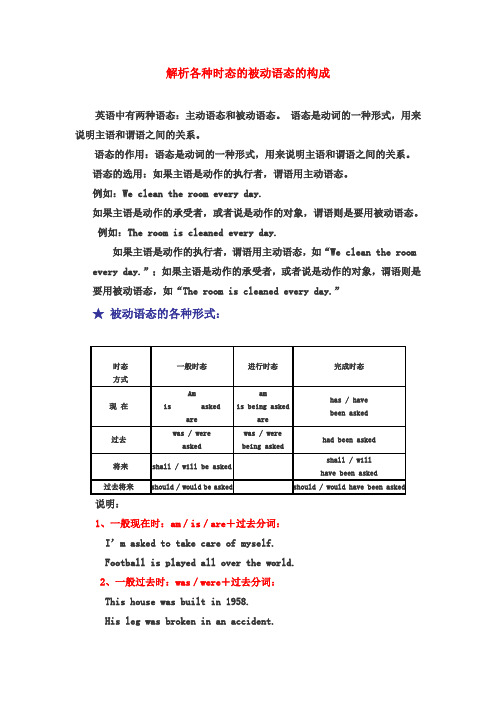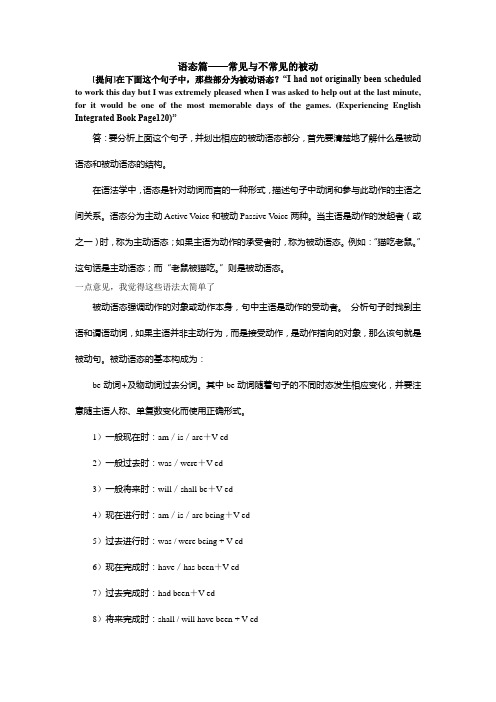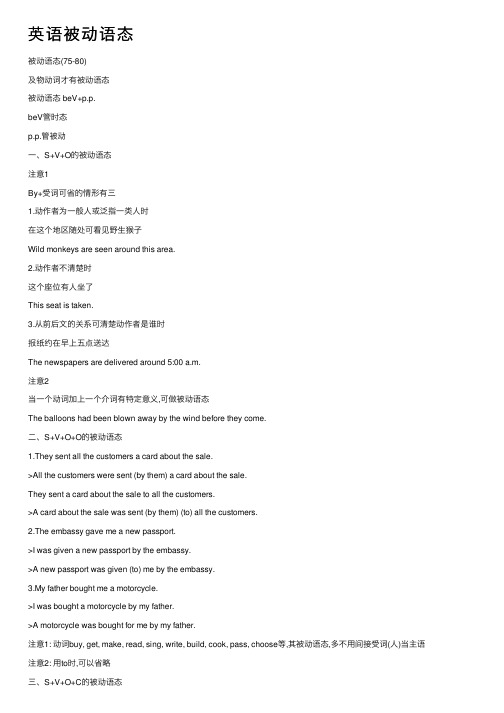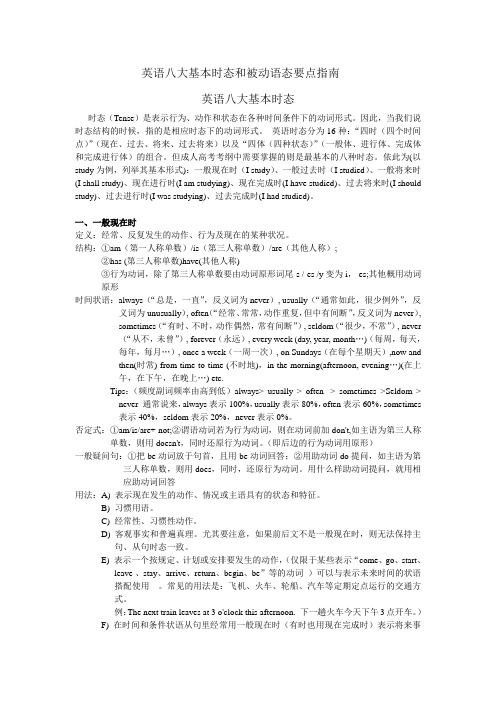英语6种常用时态的被动语态
解析各种时态的被动语态的构成

解析各种时态的被动语态的构成英语中有两种语态:主动语态和被动语态。
语态是动词的一种形式,用来说明主语和谓语之间的关系。
语态的作用:语态是动词的一种形式,用来说明主语和谓语之间的关系。
语态的选用:如果主语是动作的执行者,谓语用主动语态。
例如:We clean the room every day.如果主语是动作的承受者,或者说是动作的对象,谓语则是要用被动语态。
例如:The room is cleaned every day.如果主语是动作的执行者,谓语用主动语态,如“We c lean the room every day.”;如果主语是动作的承受者,或者说是动作的对象,谓语则是要用被动语态,如“The room is cleaned every day.”★被动语态的各种形式:说明:1、一般现在时:am/is/are+过去分词:I’m asked to take care of myself.Football is played all over the world.2、一般过去时:was/were+过去分词:This house was built in 1958.His leg was broken in an accident.3、一般将来时:will/shall be+过去分词:More factories will be built in our city.He will be taken to hospital tomorrow.4、现在进行时:am/is/are being+过去分词:A road is being built around the mountain.Many new houses are being built in this city.5、过去进行时:was/were being+过去分词:The meeting was being held when I was there.We were being trained this time last year.6、现在完成时:have/has been+过去分词:This book has been translated into many foreign languages.The prices of many goods have been cut again .7、过去完成时:had been + 过去分词:A new school had been set up by the end of last year.When the anthem had been played the conference began.8、将来完成时:shall/will have + 过去分词:The project will have been completed before July.Your clothes shall have been made for you soon.9、过去将来完成时:should/would have + 过去分词:He told me that his new cloths would be made by his mother.He told me that his new clothes would have been made very soon.★英语被动语态常见考点:动词的语态一般不单独考,而是和时态、语气和非谓语动词一起考,需要注意以下考点。
英语被动语态用法

语态篇——常见与不常见的被动[提问]在下面这个句子中,那些部分为被动语态?“I had not originally been scheduled to work this day but I was extremely pleased when I was asked to help out at the last minute, for it would be one of the most memorable days of the games. (Experiencing English Integrated Book Page120)”答:要分析上面这个句子,并划出相应的被动语态部分,首先要清楚地了解什么是被动语态和被动语态的结构。
在语法学中,语态是针对动词而言的一种形式,描述句子中动词和参与此动作的主语之间关系。
语态分为主动Active V oice和被动Passive V oice两种。
当主语是动作的发起者(或之一)时,称为主动语态;如果主语为动作的承受者时,称为被动语态。
例如:“猫吃老鼠。
”这句话是主动语态;而“老鼠被猫吃。
”则是被动语态。
一点意见,我觉得这些语法太简单了被动语态强调动作的对象或动作本身,句中主语是动作的受动者。
分析句子时找到主语和谓语动词,如果主语并非主动行为,而是接受动作,是动作指向的对象,那么该句就是被动句。
被动语态的基本构成为:be动词+及物动词过去分词。
其中be动词随着句子的不同时态发生相应变化,并要注意随主语人称、单复数变化而使用正确形式。
1)一般现在时:am/is/are+V-ed2)一般过去时:was/were+V-ed3)一般将来时:will/shall be+V-ed4)现在进行时:am/is/are being+V-ed5)过去进行时:was / were being + V-ed6)现在完成时:have/has been+V-ed7)过去完成时:had been+V-ed8)将来完成时:shall / will have been + V-ed9)过去将来完成时:would / should have been + V-ed例如:1)All kinds of commodities made in China are widely used in many American families. 这句中文翻译漏了吧。
英语被动语态

英语被动语态被动语态(75-80)及物动词才有被动语态被动语态 beV+p.p.beV管时态p.p.管被动⼀、S+V+O的被动语态注意1By+受词可省的情形有三1.动作者为⼀般⼈或泛指⼀类⼈时在这个地区随处可看见野⽣猴⼦Wild monkeys are seen around this area.2.动作者不清楚时这个座位有⼈坐了This seat is taken.3.从前后⽂的关系可清楚动作者是谁时报纸约在早上五点送达The newspapers are delivered around 5:00 a.m.注意2当⼀个动词加上⼀个介词有特定意义,可做被动语态The balloons had been blown away by the wind before they come.⼆、S+V+O+O的被动语态1.They sent all the customers a card about the sale.>All the customers were sent (by them) a card about the sale.They sent a card about the sale to all the customers.>A card about the sale was sent (by them) (to) all the customers.2.The embassy gave me a new passport.>I was given a new passport by the embassy.>A new passport was given (to) me by the embassy.3.My father bought me a motorcycle.>I was bought a motorcycle by my father.>A motorcycle was bought for me by my father.注意1: 动词buy, get, make, read, sing, write, build, cook, pass, choose等,其被动语态,多不⽤间接受词(⼈)当主语注意2: ⽤to时,可以省略三、S+V+O+C的被动语态1.His grandfather named the baby Doris.The baby was named Doris by his grandfather.2.John persuaded me to go to the dentist.I was persuaded to go the dentist by john.重点1.They made the students wait in line.The students were made to wait in line.2.He heard his dog bark/barking at a cat.His dog was heard to bark / barking at a cat (by him).3.I saw a man jump/jumping into the river.A man was seen to jump / jumping into the river by me.四、疑问句的被动语态1)YES/NO问句(beV或助动词为⾸的问句)1.Does your wife cook your meals? 你太太帮你做三餐吗? Are your meals cooked by your wife?2.Did your father bake this pizza?Was this pizza baked by your father?3.Will you finish the work tomorrow?Will the work be finished (by you) tomorrow?2)WH问句1.Who produced this CD?Who(m) was this CD produced by?By whom was this CD produced? ⽂章体2.Who do the police suspect?Who is suspected by the police?3.What do you call this in English?What is this called (by you) in English?4.What kind of program do you favor?What kind of program is favored by you?五、祈使句的被动语态1)(Don’t/Never) +原形动词>Let~1.Open the door of the room.>Let the door of the room be opened.注意let后使⽤be(原形)2.Don’t forget this lesson.>Don’t let this lesson be forgotten.>Let this lesson not be forgotten.2)Let +受词+原形动词1.Let my daughters pack the things.>Let the thing be packed by my daughters.重点: 使役动词a.make/have+O+{V.p.p.I made him to do it.I made it done.b. get+O+{to V.p.p.I got him to do it.I got it done.c. let+O+{V.be p.p.I let him do it.I let it be done.六、 say, believe, expect, know, think, consider 等的被动语态1. They say that yawns are catching. 打哈⽋会传染>It is said (by them) that yawns are catching. 据说~>>Yawns are said to be catching.It is said+that+S+V = S is said toV2. We expect that the plane will land on time.>It is expected that the plane will land on time.>>The plane is expected to land on time.3. They think that he is the best football player of the year. >It is thought that he is the best football player of the year. >>He is thought to be the best football player of the year.七、特别注意的被动语态1) 被动语态⾏为者前不加by情绪动词如interestEnglish interests me.English is interesting to me.I am interested in English.be shocked at (by)be surprised/amazed at (by)be amused at (by)be disappointed at (by)+事对~(事)感到失望be disappointed in (with, about)+⼈对~(⼈)感到失望be satisfied withbe excited aboutbe embarrassed aboutbe interested inbe known to+⼈be covered with+物be crowded with+物with + 道具,⼿段,物品as + ⾝份by + 动作者,⾏为者1.She was shocked at the man’s bad manners.2.Her parents were satisfied with her school report.3.Mr. Wang was known to many young students.注意4.The language is known by everyoneknown+by+⾏为者 everyone都实际学习了,是⾏为者be known to为...所知be known by通过...(了解到)5.She is known as an excellent pianist. ⾝为~⽽闻名6.The box was covered with a black cloth by the magician.7.Many people were killed in the plane crash.8.He is absorbed in buying and selling real estate. 热衷于~real estate 不动产,房地产 personal estate 动产 estate agent英/ realtor美房屋中介2)具有被动语态功能的过去分词,有时可修饰名词1.These are home-made cakes.2.Excited spectator rushed into the playground.3)不定词,动名词也可⽤于被动to be>to be p.p.Ving>being p.p.1.我不喜欢成为别⼈的话题I don’t like to be talked about.2.Nobody likes being made fun of.4)被动语态,有时表⽰动作,有时表⽰状态1.The street lights are switched on at sunset. 动作The street lights are switched now. 状态2.My little brother is dressed by my mother.My little brother is dressed in red pants today.be dressed/dress onself注意1有时为了强调动作,经常⽤become, get, grow代替be动词1.She got dressed very quickly. 穿⾐服很快注意2有时为了强调状态,会⽤lie, stand, remain, stay等代替be动词2.The city lies buried under the sand.3.The door remained closed until morning.5)2.Your paper reads like a novel. 你的报告3.Long use has worn his gloves at the tips.长久的使⽤使他⼿套的指尖部分磨损了4.Red wine stains don’t wash out easily.5.The door doesn’t lock.6.This tough steak doesn’t cut easily.6)经验性的被动语态have/get+O+p.p. >被害1.I had my house burned down in the fire.我家在那场⽕灾中付之⼀炬2.I got my pocked picked.我的钱被扒了3.I got my wrist broken.我弄折了我的⼿腕注意以下表⽰纯粹被动,⽆被害4.I got my tooth pulled out. 我⽛被拔了/我拔⽛了5.I had my hair cut. 我理发了7)惯⽤的被动语态a.be bornI was born in 1975.注意⽣产(baby);忍受bear-bore-borne出⽣bear-bore-born1.My mom has borne four children.2.You were borne by me. 你是我⽣的3.He was born on January 1. 他出⽣在⼀⽉⼀⽇b.be married 结婚 marry嫁;娶They have been married for seven years.c.be injured / be wounded / be hurt 受伤hurt-hurt-hurtinjure (⽆限定)使~受伤wound (以⼑,枪)使~负伤hurt (精神上,⾁体)伤害1.She was badly/slightly injured in the accident.2.He was wounded in the left leg.3.Aren’t you hurt?d.be/get acquainted with 熟悉They are acquainted with each other.e.be engaged in从事~,忙于~be engaged to sb.订婚1.My father is engaged in business.2.John is engaged to Mary.f.be used/accustomed to(prep.) 习惯1.They are accustomed to foreign manners.2.I am used to staying up late at night.注意be used to N/Ving 习惯~used to V 以前习惯,过去常常1.My father used to smoke, (but now he doesn’t.)2.He used to be a naughty boy.(现在不是了)g.be seated 坐下Please be seated.Please seat yourself.Please sit down.Please seat yourself.助动词(81-85)⼀.助动词的特征1.其后须接原形动词2.现在式中,主词为第三⼈称单数,字尾不加sHe cans speak English.3.形成否定句,助动词后加notHe cannot speak English.4.形成疑问句时,直接将助动词置于主词前He can speak English.>Can he speak English?5.两个助动词不能连⽤You will can swim soon.You will be able to swim soon.⼆.助动词的⽤法1)can(could) [能⼒,许可,可能]a.表[能⼒]=be able to1.He can speak Japanese, but he cannot/can’t write it.2.She tried to tie the rope, but she couldn’t(过去式).3.I will be able to finish the paper, and go out to see the exhibition tomorrow.4.I haven’t been able to recall his name.b.表[可能]1.It cannot be true.2.This kind of thing can happen every now and then.3. A quarrel can sometimes cause trouble.4.The light in the sky could be a UFO. 过去式c.表[许可]1.You can come in if you have a ticket.2.I’m afraid you can’t park your car here.3.--Can I leave early because I’m not well today?--Certainly.d.表[请求]1.Can you do me a favor?Could you do me a favor? 更为客⽓注意⼀般来说,对⾃⼰的⾏为会⽤Can I~?⽽对对⽅的⾏为则⽤Could you~?2.Could you repeat your cell phone number, please?2)may(might)a.表[许可]1.You may not chew gum in class.2.--May I interrupt you?--Sure.b.表[可能]1.You may be right but I am against your opinion.2.His health may or may not turn for the better.3.She might not know that you are here.might所表⽰的可能性较may低c.表[祈愿]1.May I never see a sight like that again!愿我不会再看见那样的景象2.May you succeed.祝你成功3)musta.表[义务,命令]1.You must return this book by next Tuesday.2.You must not talk with your mouth full.注意must not 不可以,禁⽌3.Must I really attend the meeting?--Yes, you must.--No, you need not.--No, you don’t have to.注意must=have tomust只能⽤于现在式其过去式只能⽤had to, 未来式⽤will have to, 完成式⽤have had to 代替1.I had to go to see the doctor because I caught a cold.I caught Tom’s cold. 被Tom传染了感冒2.You‘ll have to replace the light bulb.3.We have had to stay here because it’s raining heavily/cats and dogs outside.我们必须⼀直待在这⾥,因为外⾯正在下⼤⾬重点⼝语中,常⽤have got to 代替have to其中have是准助动词1.You’ve got to be more patient, Mary.由于have是准助动词,所以可以缩写b.表[推测]1.You must be kidding.2.That is an enormous animal; it must weigh a ton.重点表推测时的must,否定⽤cannot, must not 是不可以,禁⽌1.She’s very young. She cannot be over twenty.c.表[必然]1.All man must die.⼈⼀定会死4)willa.表[现在的推测]1.Mom will be downstairs now.妈妈现在应该在楼下吧2.That will be his house.那应该是他家吧b.表[主词强烈的意志;固执]1.The windows will not open.窗户怎么也打不开 (⼈的感受,也许其他⼈感到可以打开)2.He will insist on his right.他要坚持他的权利c.表[习惯;倾向]1.Accidents will happen.事故总会发⽣2. A drowning man will catch at a straw.溺⽔者总会攀草求援d.表[请求;劝诱]1.Will you bring me a ladder?⿇烦你拿个梯⼦给我好吗2.Will you have one more coffee?你要不要再来杯咖啡呢?5)wouldwould为will的过去式,但其有特殊的⽤法a.表[客⽓的请求]1.Would you mind if I sit next to you?Would you mind me/my sitting next to you?2.Would you call me back later?Would you please call me back later?Would you call me back later, please?b.表[过去的习惯/常常做的事情]常伴随sometimes, often等频率副词1.Before they had television, people would listen to the radio. Before they had television, people listened to the radio. 语⽓没上去在有电视之前,⼈们常常听收⾳机2.Susan would often chat with us at this coffee shop.Susan以前经常和我们~,(现在不了)c.表[过去的意志]1.You wouldn’t eat carrots when you were a boy.2.The rusty screw wouldn’t come loose.这⽣锈的螺丝怎么也弄不开6)used toa.表[过去习惯]1.John used to work part-time(adv.) at a restaurant after school.2.I used to go for a swim on my lunch break, but now I don’t.3.I used to go to the movies every Sunday.I wound often go to the movies when I was young.used to 表⽰过去相当长的习惯would 表⽰过去动作的重复, 其习惯意味较淡注意used to的否定形used not to(因其为助动词) / didn’t use to疑问为Used+S+to~? 或 Did+S+use to?1.He used not to drink.He didn’t use to drink.eat soup 喝汤/doc/3e2675664.htmled he to go to school with you?Did he use to go to school with you?3.We used to talk about our future, {didn′t weusedn′t web.表[过去持续的状况]1.There used to be an old temple here.这⾥曾经有⼀座古庙2.He isn’t what he used to be three years age.他不再是三年前的他了重点物 be used to V >(物)被⽤来~⼈ be used to Ving >(⼈)习惯~⼈ used to V >过去习惯于1.The knife is used to cut bread.2.I am used to keeping good hours. 早睡早起7)shoulda.表[义务]1.You should exercise more and eat less.play sports有运动项⽬, take exercise扭扭腰什么的2.The government should spend more money on education.b.表[推测] 应该会~吧1.Our guests should be here within an hour.be my guest 别客⽓,请⽤;请便2.I sent you e-mail/an e-mail yesterday, so you should know about the invition.c.表[强烈的惊奇]1.Who should make such a foolish mistake?谁会犯如此愚蠢的错误呢?2.How should I know it?我怎么会知道呢?重点ought to(应该) 语⽓强于should, 在⼝语中常⽤1.My bicycle ought to/should/was supposed to be here because I left it just beside the telegraph pole.我的脚踏车应该在这⾥,因为我就把它停在电线杆旁2.You oughtn’t (to) do so.3.Ought we (to) tell him about it?在疑问和否定,美语常省to8)need (普通动词/助动词)助动词只在否定句,疑问句,肯定句直接⽤need(动词)1.You don’t need to speak so loud. I hear you very well. 普通动词You need not speak so loud. I hear you very well. 助动词2.--Do I need to record the program on the tape? 普通动词--No, you don’t need to.--Need I record the program on the tape? 助动词--No, you needn’t.--Yes, you must. need作助动词不能⽤在肯定句9)dare (dare-dared)dare + VR 助动词dare +(to)+ VR ⼀般动词1.She dare not/daren’t tell the truth. 助动词She does not dare to tell the truth. ⼀般动词She does not dare tell the truth. ⼀般动词2.I dared not laugh at him at that time. 助动词I didn’t dare to laugh at him at that time. ⼀般动词I didn’t dare laugh at him at that time. ⼀般动词3.How dare you ask me for help?4.I dare say he is right.三.含助动词的惯⽤表现1)助动词+have+过去分词a)代替过去式表达⼀种[过去]1.You may have heard this joke before.may heard不存在,使⽤may have heard代替,表达⼀种[过去]2.The keys might have fallen out of your pocket. 表达⼀种[过去]3.I must have been asleep. I didn’t hear your footsteps. 表达⼀种[过去]可能性must>may>might4.He cannot have survived in the accident.b)表达责备:本应该,却没有; 本不应该,却5.You should/ought to have applied for the job sooner.6.She need not have come so early.2)含有can的惯⽤表现1.cannot help+VingI cannot help crying whenever I hear that song.2.cannot help but VI cannot help but think so.3.cannot…too…⽆论再~也不为过You cannot be too careful when you choose a husband.3)含may(might)的惯⽤表现1.may well +V ⼤可~; 恐怕是~He may well say so. 他⼤可这么说She may well be lost. She has a poor sense of direction. 她恐怕迷路了2.may(might) as well +V…不妨~You’ll never solve that problem. You might as well give up.3.may(might) as well V(b) as V(a)…与其(a)不如(b)You might as well throw your money into the sea as lend it to him.与其借给他不如丢到海⾥4)should⽤于that⼦句a.表[感情因素] 表达这很正常或他竟然~此句型中常⽤的有:surprising, strange, lucky, sad, regrettable, natural, a pity等1.It is natural that she should want to have children.她想要有⼩孩是很⾃然的事2.It’s a pity that he should be sick in bad.It’s a pity that he is sick in bad他竟然卧病在床,实在可惜去掉should也可,不过加上更能表达情感b.表[当然; 必要]此句型中常⽤的有:important, necessary, essential不可或缺, desirable期望, right等1.It is necessary that you (should) take this medicine right away.2.It is important that he should remember this formula.It is important that he remember this formula 注意,不可remembers c.表[提案, 要求]此句型中常⽤的有:advise, decide, demand(要求), insist(坚持要求), order, propose提议, request要求, suggest1.I suggest that the meeting should be postponed.I suggest that the meeting be postponed. 注意原形2.Mother insists that my brother should get up at five every morning.Mother insists that my brother get up at five every morning.d.含would的惯⽤表现1.would rather V than V 宁愿~不愿I would rather go today than yesterday.I had rather go today than yesterday.2.would like to VI would like to have a date with him.I want to have a date with him.I feel like having a date with him.。
英语中的被动语态和被动语态的变化

被动语态在英语中是非常常用的语法现象之一。
在被动语态中,动作的承受者成为句子的主语,而动作的执行者则成为谓语动词的宾语。
被动语态的结构通常由一个助动词“be”加上一个动词的过去分词构成。
被动语态的使用可以使句子更加准确、有礼貌,并且可以突出动作的执行者或者承受者。
被动语态的变化根据动作的时态和语态的不同而有所差异。
下面将对被动语态的变化进行一一阐述。
一、一般现在时的被动语态:在一般现在时的被动语态中,助动词“be”的形式为am/is/are,它们分别对应主语为第一人称单数、第三人称单数以及复数的情况。
过去分词则保持原状。
例如:•主动语态:They deliver the goods.•被动语态:The goods are delivered by them.二、一般过去时的被动语态:在一般过去时的被动语态中,助动词“be”的形式为was/were,它们分别对应第一人称单数和复数、以及第三人称单数的情况。
过去分词依然保持原状。
例如:•主动语态:He repaired the car.•被动语态:The car was repaired by him.三、一般将来时的被动语态:在一般将来时的被动语态中,助动词“be”的形式为will be。
过去分词仍然保持原状。
例如:•主动语态:We will finish the project.•被动语态:The project will be finished by us.四、现在进行时的被动语态:在现在进行时的被动语态中,助动词“be”的形式为am/is/are,过去分词后加上-ing形式构成。
例如:•主动语态:She is writing a letter.•被动语态:A letter is being written by her.五、一般过去进行时的被动语态:在一般过去进行时的被动语态中,助动词“be”的形式为was/were,过去分词后加上-ing形式构成。
各种时态被动语态的结构

各种时态被动语态的结构在学习英语时态的时候,大家总是被主动语态和被动语态搞得晕头转向。
今天,我们就来聊聊被动语态,轻松幽默地把它讲清楚,让你一看就懂。
被动语态其实很简单,简单说就是“主语+be动词+过去分词”。
比如说,“The cake was eaten by the kids.” 就是个经典的例子,听着就觉得有趣,对吧?在这句子里,蛋糕是受害者,孩子们是罪魁祸首。
然后,咱们得看看各种时态的被动语态。
有过去式、现在式、将来式,甚至现在完成式。
咱们先从简单的开始。
比如现在时,“The book is read by many people.” 这句听着就觉得书真受欢迎,大家都在阅读呢。
再说过去时,“The song was sung by her.” 哇,那肯定是个好歌,她唱得一定很棒。
说到将来时,“The homework will be finished by tomorrow.” 嘿,听上去好像大家还在赶工啊。
而现在完成时就更有趣了,“The project has been completed.” 听着就像是在说,“嘿,事情搞定了!”这句简单明了,反映出某种成就感。
说到被动语态,还得提提不同时态的变化。
比如在现在进行时,“The dinner is being cooked.”,想象一下,厨房里香气四溢,真是让人流口水。
再说过去进行时,“The house was being painted.” 这时候,房子可忙了,正被刷得焕然一新。
有趣的是,被动语态也有它的独特魅力。
当我们想强调动作的承受者而不是执行者时,就可以用被动语态。
比如说,“Mistakes were made.” 哎,这可真是一种外交辞令,听着就像在说,“别追究了,反正错的都是我。
”这样的表达总能让人忍俊不禁。
还记得我朋友说过的一个例子吗?他说,“The cookies were stolen!” 听起来有点悲伤,不过也是个小故事。
英语八大基本时态和被动语态要点指南+

英语八大基本时态和被动语态要点指南英语八大基本时态时态(Tense)是表示行为、动作和状态在各种时间条件下的动词形式。
因此,当我们说时态结构的时候,指的是相应时态下的动词形式。
英语时态分为16种:“四时(四个时间点)”(现在、过去、将来、过去将来)以及“四体(四种状态)”(一般体、进行体、完成体和完成进行体)的组合。
但成人高考考纲中需要掌握的则是最基本的八种时态。
依此为(以study为例,列举其基本形式):一般现在时(I study)、一般过去时(I studied)、一般将来时(I shall study)、现在进行时(I am studying)、现在完成时(I have studied)、过去将来时(I should study)、过去进行时(I was studying)、过去完成时(I had studied)。
一、一般现在时定义:经常、反复发生的动作、行为及现在的某种状况。
结构:①am(第一人称单数)/is(第三人称单数)/are(其他人称);②has (第三人称单数)have(其他人称)③行为动词,除了第三人称单数要由动词原形词尾-s /-es /y变为i,-es;其他概用动词原形时间状语:always(“总是,一直”,反义词为never), usually(“通常如此,很少例外”,反义词为unusually), often(“经常、常常,动作重复,但中有间断”,反义词为never),sometimes(“有时、不时,动作偶然,常有间断”), seldom(“很少,不常”), never(“从不,未曾”), forever(永远), every week (day, year, month…)(每周,每天,每年,每月…), once a week(一周一次), on Sundays(在每个星期天),now andthen(时常) from time to time (不时地),in the morning(afternoon, evening…)(在上午,在下午,在晚上…) etc.Tips:(频度副词频率由高到低)always> usually > often > sometimes >Seldom >never 通常说来,always表示100%,usually表示80%,often表示60%,sometimes表示40%,seldom表示20%,never表示0%。
英语的主动语态和被动语态

主动语态和被动语态一、被动语态的用法:1. 一般现在时的被动语态构成: is / am / are + 及物动词的过去分词Our classroom is cleaned every day. 我们教室每天都被打扫。
I am asked to study hard. 我被告知要努力学习。
Knives are used for cutting things. 刀是用来切东西的。
2. 一般过去时的被动语态构成: was / were + 及物动词的过去分词A new shop was built last year. 去年修了一座新商店。
Dinosaur eggs were laid long long ago. 恐龙蛋被放置了很久很久。
3. 一般将来时的被动语态构成:will+ be + 及物动词的过去分词A new hospital will be built in our city. 我们城市将要修建一家新医院。
Many more trees will be planted next year. 明年会种更多的树。
4. 现在进行时的被动语态构成: am / is / are + being + 及物动词的过去分词 Uncle Wang is mending my bike now.→ My bike is being repaired by Tom now. 王叔叔正在修理我的自行车。
They are planting trees over there. → Trees are being planted over there by them.他们在那里种植的树木。
5. 现在完成时的被动语态构成:has / have + been + 及物动词的过去分词 This book has been translated into many languages. 这本书被翻译成多种文字。
Many man-made satellites have been sent up into space by many countries. 在许多国家有许多人造卫星被送上了太空。
英语语法:被动语态用法大全

英语语法:被动语态用法大全英语语法:被动语态用法大全概念语态(Voice)是动词的一种形式,用以表示主语和谓语之间的关系。
英语的语态包括两种形式:主动语态(active voice)和被动语态(passive voice)。
主动语态表示主语是动作的执行者,被动语态表示主语是动作的承受者。
被动语态是动词的一种特殊形式,一般来说,只有需要动作对象的及物动词才有被动语态。
主动语态表示主语是动作的执行者。
巧记为:主动、主动、主去动。
Many people speak English.谓语:speak的动作是由主语many people来执行的。
被动语态表示主语是动作的承受者,即行为动作的对象。
巧记为:被动、被动、主被动。
English is spoken by many people.主语English是动词speak的承受者。
He opened the door.他开了门。
(主动句)The door was opened.门被开了。
(被动句)构成His bicycle was stolen.The building has been built in 2000.通过上面的例句,可以看出,“被动语态”的构成是:be + 过去分词 ( + by + 动作执行者) 形式被动语态由助动词be加及物动词的过去分词构成,强调动作是由什么人或什么东西而发出时,常用介词“by +行为发出者”,即be+done+by+行为发出者。
被动语态可用于各种时态,通过助动词be的变化来表示:1、一般现在时的被动语态. am / is / are + 动词的过去分词Our classroomis cleaned every day.This car is made in China.2、一般过去式的被动语态: was / were + 动词的过去分词His desk was cleaned just now.The station was built in 1928.3、现在进行时的被动语态: am / is / are + being + 动词的过去分词A new factory is being built in our city now.Some trees are being cut down in the park.4、过去进行时的被动语态: was / were + being + 动词的过去分词A new factory was being built in our city at that time.Some babies were being looked after by Miss Chen last year.5、一般将来时的被动语态:(A) will / shall + be + 动词的过去分词(B) am / is / are + going to be +动词的过去分词.Some new factories will be built in our city this year.Your watch is going to be mended in an hour.6、过去将来时的被动语态:(1)would / should + be + 动词的过去分词(2)was / were +going to be + 动词的过去分词.She said that some new factories would be built soon in our city.He thought that your watch was going to be mended after an hour.7、现在完成时的被动语态:have / has + been + 动词的过去分词Some new factories have been built in the city since last year.Your watch has been mended already.8、过去完成时的被动语态:had + been + 动词的过去分词He said that some new factories had been built in the city.I didnt know that my watch had been mended .9、含情态动词的被动式:can/may/must + be + done(1)You must hand in your homework after class.Your homework must be handed in after class.(2)He can write a letter with the computer.A letter can be written with the computer by him.初中英语八大时态一般现在时一般过去时一般将来时现在进行时过去进行时过去将来时现在完成时过去进行时运用第一种情况:不知道动作的执行者,就是不知道谁干的Dan's bike was stolen last week. 丹的自行车上周被偷了。
- 1、下载文档前请自行甄别文档内容的完整性,平台不提供额外的编辑、内容补充、找答案等附加服务。
- 2、"仅部分预览"的文档,不可在线预览部分如存在完整性等问题,可反馈申请退款(可完整预览的文档不适用该条件!)。
- 3、如文档侵犯您的权益,请联系客服反馈,我们会尽快为您处理(人工客服工作时间:9:00-18:30)。
英语6种常用时态的被动语态
1 / 21 / 2
6种常用时态的被动语态 姓名:
由“助动词be + 动词的过去分词”构成。助动词be 有时态、人称和数的变化。
(1) 一般现在时:am/is/are +过去分词
。时间标志词:everyday/often/usually/
如:
Rice is grown in south China. 华南种植水稻。
(2) 一般过去时:was/were+过去分词。
时间标志词:yesterday/just now/ago
等。如:
The glass was broken yesterday. 这块玻璃是昨天打烂的。
(3)一般将来时:will be +过去分词
。时间标志词:tomorrow/next week等。
如:
The cars will be sent abroad by sea. 这些汽车将由水路运往国外。
(4) 现在进行时:am/is/are being +过去分词。
时间标志词:now等如:
The project is being carried out. 这个计划正在执行中。
(5)过去进行时
:was/were/being +过去分词。时间标志词:just then等如:
This road was being built this time last year. 这条路去年这个时候还在修建。
(6)现在完成时
:have/has been +过去分词。时间标志词:so far等如:
This novel has been translated into several languages. 这本小说已被译成了几
种语言。
英语6种常用时态的被动语态
2 / 22 / 2
二、不能用被动语态的情况
1. 不及物动词没有被动语态
因为不及物动词没有宾语,所以若将其用于被动语态则没有主语,故不能用于被动语
态。但是值得注意的是,有些英语中的不及物动词,译成汉语时却可能是“及物”的,很
容易出错,这类动词如:take place(发生),happen(发生),come about(发生),break out(爆
发),appear(出现),disappear(消失),last(持续),arise(出现,发生)等:
A fire broke out during the night. 夜间发生了火灾。
2. 某些静态动词不用于被动语态
英语有些静态动词(如have, lack, fit, hold, suit, resemble 等)通常不用于被动
语态,如以下各句均不能变为被动语态:
My shoes don’t fit me. 我的鞋不合适。
3. 宾语为相互代词和反身代词时不用于被动语态
由于相互代词和反身代词通常不能用作主语,所以当它们用作动词宾语时,句子不能
转换成被动语态:
We should help each other. 我们应该互相帮助。
三、英语主动表被动用法归纳
1、某些连系动词(如look, sound, smell, feel, taste, prove等)要用主动表被动,
因为连系动词为不及物动词,它们没有被动语态形式:
That dog looks dangerous. 那只狗看起来很危险。
2、不定式用于某些动词(如have, have got, get, want, need等)的宾语后作定语时,
如果不定式的逻辑主语就是句子的主语,则要用主动形式表示被动意义:
I have some letters to write. 我有一些信要写。
I want something to drink. 我想喝点什么。
